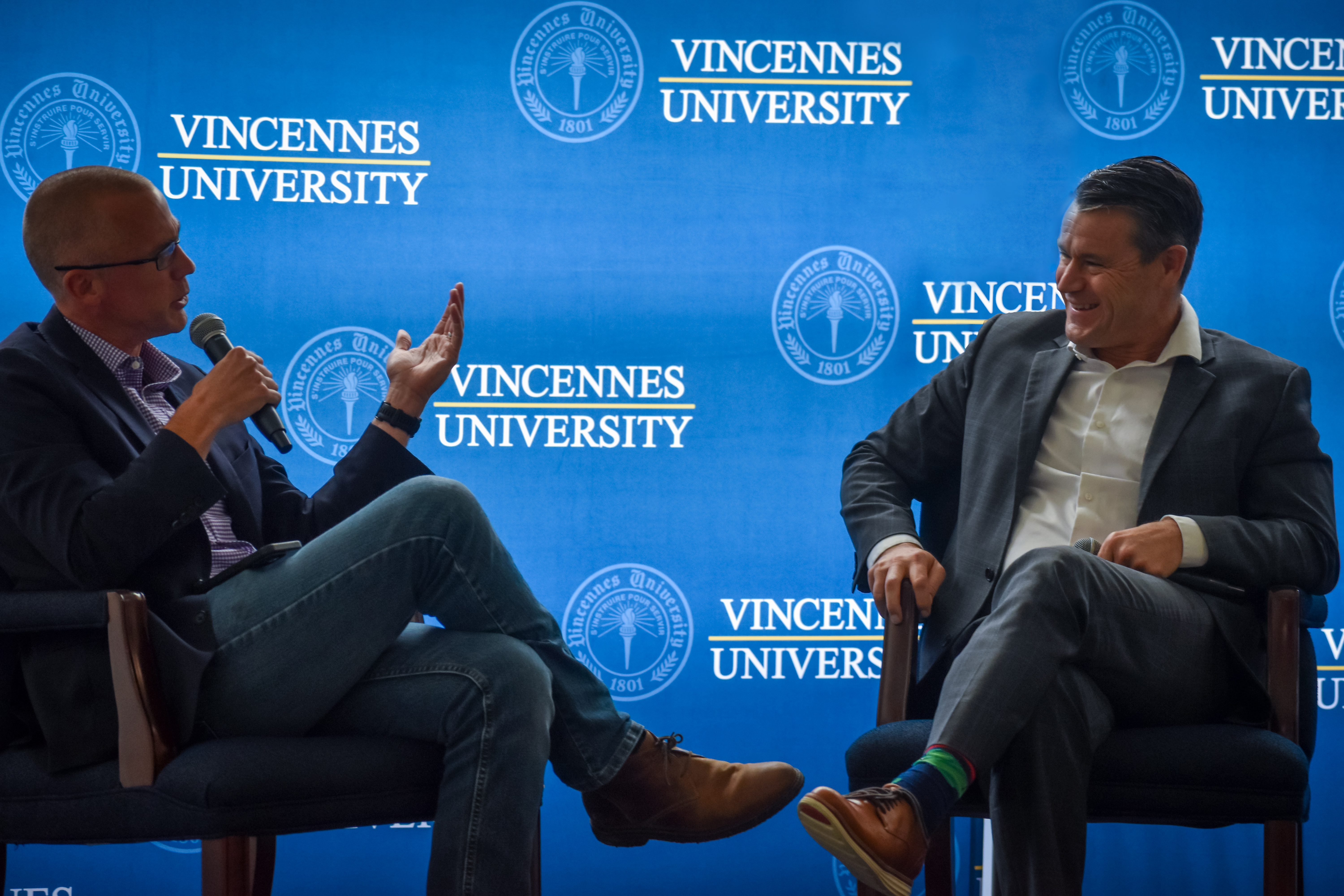VU hosts U.S. senator and discussion on Indiana’s rapidly-evolving agbioscience economy

August 10, 2023
VINCENNES, Ind. - U.S. Senator Todd Young of Indiana, Indiana experts, and Hoosier leaders gathered at the Vincennes University Agricultural Center on Wednesday, Aug. 9, for a fireside chat about 21st-century agriculture and the rapid growth Indiana’s agbioscience economy has experienced over the last decade. The discussion was presented by AgriNovus Indiana and VU.
According to VU President Dr. Chuck Johnson, “It is so exciting to talk about agbioscience innovation because agriculture is so important to this region that we call home. The University extends its gratitude to Senator Todd Young and Mitch Frazier of AgriNovus Indiana for shining the spotlight on the exciting future of this industry for VU and our many partners in this region and state.”
Agbioscience, also known as agriculture bioscience, is at the intersection of where food, agriculture, science, and technology meet. The industry focuses on leveraging cutting-edge advancements to enhance agricultural production; animal health and nutrition; agricultural equipment and technology; plant science and crop production; and value-added food and nutrition, and addresses challenges related to food security, environmental sustainability, and resource efficiency.
Indiana is a national leader in agbioscience research, development, and innovation, according to AgriNovus Indiana and the Indiana Economic Development Corporation (IEDC).

The fireside chat featuring Senator Young and AgriNovus Indiana President and CEO Mitch Frazier served as a vibrant platform for them to share their expertise about where agbioscience sits today, Indiana maintaining its competitive edge globally, and the continued pursuit of new initiatives to expand the workforce to grow and support a key sector of the state’s economy.
Young is well-versed in agriculture economics. His master’s degree thesis focused on the economics of Midwestern agriculture.
“Indiana leads the way across the United States not just in food production, but also in food science,” Young said. “Ag research is where I see a real opportunity to change the game. Indiana is better positioned than perhaps anyone else to grab this and run with it.”
The chat fostered insightful conversations, collaborative networking, enabling participants to forge meaningful connections and catalyze enterprises that drive the agbioscience sector forward.
VU is empowering a modern workforce by offering specialized education in an array of agbioscience-related bachelor’s degrees, associate degrees, and certificates, including Agriculture; Cellular Biology and Genetics; Food Process Engineering; Pre-Veterinary and Pre-Veterinary Technology; Agricultural and Biological Engineering; Sustainable Foods and Farming Systems; Horticulture and Landscape Design; Agribusiness; Animal Husbandry; Agronomy; and Urban Agriculture.
These programs are educating VU graduates for 21st-century careers by equipping them with the latest knowledge and essential skills to contribute to the agbioscience industry’s needs. Graduates can become innovators, researchers, entrepreneurs, and professionals in agbioscience fields.
Johnson said, “Indiana’s skilled and diverse workforce in farming, food production, and related industries, along with all that is happening in automation and robotics, are among the many reasons agbioscience companies are growing in Indiana. Just as every seed requires a specific environment to grow, Vincennes University is working with great partners like AgriNovus Indiana to plant the seeds of success in students and provide unique pathways that lead to life-changing careers in the agbioscience industry.”
Indiana’s agbioscience economy employs around 157,000 directly and more than 300,000 more broadly, according to Frazier, and those numbers are accelerating.

Frazier said, “Indiana’s agbioscience economy has momentum behind it, and it’s not just in big cities. There is growth happening across the state. Indiana’s agbioscience economy is more than a $90 billion contributor to the state’s economy. If we look at employment in the state, it employs about 157,000 people directly in this economy. If we take a broader view of what's the real impact, it’s over 300,000. It’s about 10 percent of the state’s workforce. Ten percent of the state’s workforce, driving 20 percent of the state’s economy…that is our agbioscience economy.”
# # #
